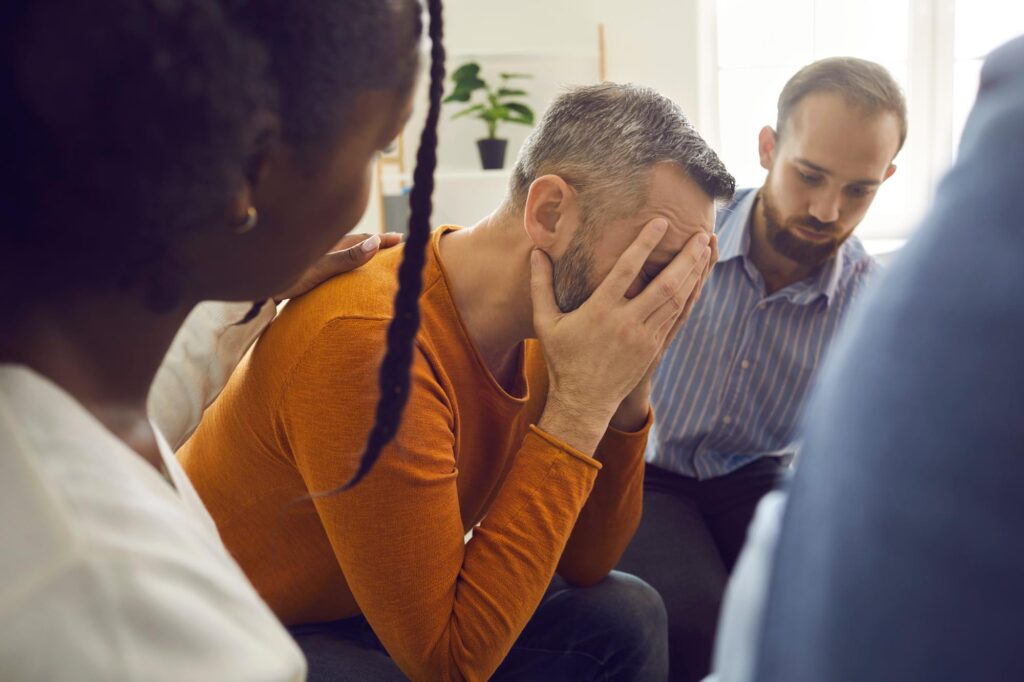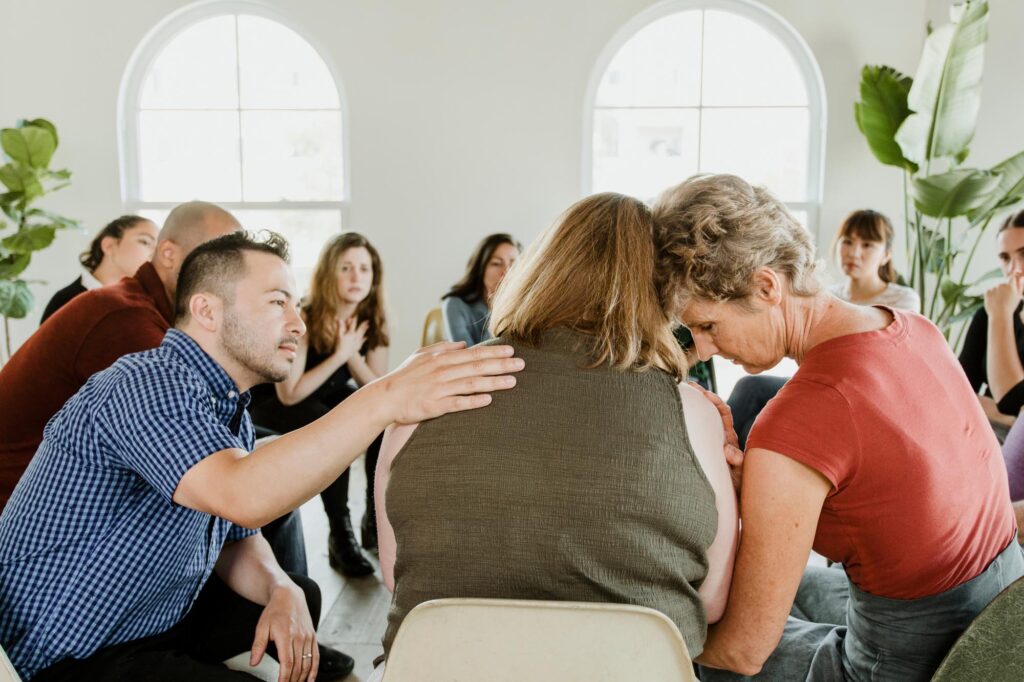Group therapy is a highly effective form of mental health treatment that brings together people facing similar challenges in a structured and supportive environment. Led by trained professionals, this collaborative approach allows participants to connect, share experiences, and learn from one another as they navigate their healing journeys.
Unlike traditional one-on-one therapy sessions, group therapy offers a unique opportunity for individuals to engage with others who can relate to their struggles. This social aspect of treatment is particularly beneficial for those seeking support for conditions such as anxiety, depression, or addiction.
In this article, we will explore the numerous benefits of group therapy and how it can complement other forms of mental health care. Whether you’re considering joining a group or looking for additional resources to enhance your recovery process, understanding the advantages of this therapeutic approach can empower you on your path towards better mental well-being.
What Is Group Therapy?

Group therapy is a powerful form of psychotherapy where a trained mental health professional guides multiple individuals through their healing journey together.
This therapeutic approach creates a structured environment where participants share experiences, challenges, and victories under professional guidance.
Key Features of Group Therapy Sessions
A typical group therapy session includes:
- Small, Intimate Setting: 4-10 participants to ensure meaningful interaction
- Time-Focused Format: 90-minute sessions allowing deep exploration of topics
- Regular Schedule: Weekly meetings to maintain momentum and progress
- Professional Leadership: Licensed therapists direct discussions and activities
The Role of Mental Health Professionals in Group Therapy
Mental health professionals bring specialized expertise to group therapy sessions. These trained facilitators:
- Create a balanced dynamic among participants
- Guide productive discussions
- Ensure emotional safety
- Provide clinical insights
- Monitor individual progress
Related: Men’s Mental Health Month 2025: A Call to Action for Better Wellbeing
Benefits of the Group Setting in Therapy
The group setting amplifies therapeutic benefits through shared experiences and mutual support. Each session builds upon previous meetings, creating a progressive journey toward mental wellness. Participants engage in various therapeutic techniques, from cognitive behavioral exercises to mindfulness practices, all while benefiting from the collective wisdom and support of their peers.
This collaborative approach to mental health treatment provides unique advantages that complement individual therapy and other treatment methods. The group dynamic creates opportunities for real-time feedback, social learning, and practical application of coping strategies in a supportive environment.
Ready to take the next step toward healing in a supportive, community-focused environment? Contact Pacific Breeze Recovery today to learn how our expert-led group therapy sessions can help you build lasting recovery.
Top 10 Benefits of Group Therapy for Mental Health
The benefits of group therapy extend far beyond traditional one-on-one counseling sessions. Group therapy creates powerful opportunities for healing, growth, and lasting positive change through shared experiences and collective support.
1. Reducing Isolation and Feeling Less Alone
Isolation can intensify mental health challenges, making recovery feel like a solitary journey. Group therapy breaks through these barriers by connecting individuals who share similar struggles. When participants hear others voice familiar thoughts, fears, and experiences, it creates an immediate sense of belonging and understanding.
The power of shared experiences in group therapy settings helps participants realize they’re not alone in their mental health journey. A person struggling with depression might discover others who understand the weight of getting out of bed each morning. Someone battling social anxiety might find comfort in meeting others who share their fears of social situations.
These connections create a natural support system where:
- Members validate each other’s experiences
- Participants share relatable stories and challenges
- People feel understood without judgment
- Individuals gain perspective on their own struggles
The group dynamic naturally combats feelings of isolation by fostering genuine human connections. Members often report feeling “normal” for the first time when they realize others face similar challenges. This shared understanding becomes a cornerstone of healing and recovery in group therapy settings.
2. Creating a Safe Space for Emotional Expression
Group therapy creates a protected environment where participants can express their deepest emotions without fear of judgment. Licensed therapists establish clear confidentiality guidelines, ensuring personal disclosures stay within the group setting.
This secure space allows members to:
- Share difficult experiences they might hesitate to discuss elsewhere
- Process complex emotions at their own pace
- Express vulnerability without fear of social consequences
- Practice authentic self-expression
The group’s collective agreement to maintain confidentiality builds trust, creating an atmosphere where genuine healing can occur. Members often discover they can voice thoughts and feelings they’ve kept hidden, leading to profound emotional release and personal growth. This safe environment becomes a testing ground for new ways of relating to others and understanding oneself.
3. Facilitating Peer Support and Sharing Coping Mechanisms
Group therapy provides a valuable opportunity for participants to share practical solutions and strategies that have worked for them in their mental health journeys. This exchange of ideas can greatly enhance everyone’s toolkit of coping mechanisms.
One of the main advantages of group therapy is the collaborative learning environment it fosters. When one member opens up about how they effectively handle anxiety attacks using grounding exercises, others benefit by acquiring new techniques for their own personal growth. These conversations between peers often uncover innovative approaches that even seasoned therapists might not have thought of.
The support system established in group therapy goes beyond the scheduled sessions. Many participants develop meaningful relationships with one another, leading to the creation of informal support networks through:
- Phone check-ins during challenging times
- Sharing resources and recommending books or articles
- Organizing virtual support groups in between sessions
- Finding practice partners to reinforce newly learned coping skills
These natural connections serve as a complement to professional therapy, offering continuous emotional support and practical help whenever needed.
4. Building Communication Skills and Socialization Skills
Group therapy creates a dynamic environment where participants actively develop essential communication skills. The structured setting allows members to:
- Practice active listening techniques
- Learn to express thoughts clearly and directly
- Receive real-time feedback on communication styles
- Navigate group dynamics effectively
These interactions serve as a practical training ground for social skills development. Members learn to:
- Read non-verbal cues and body language
- Set healthy boundaries in relationships
- Handle conflict constructively
- Share space and attention appropriately
The skills gained through group therapy naturally transfer to daily life – improving work relationships, strengthening family bonds, and enriching social connections. Many participants report feeling more confident in social situations and better equipped to handle interpersonal challenges after regular group therapy sessions.
5. Finding Your Voice and Using It Confidently
Group therapy creates a unique platform where participants discover and strengthen their authentic voice. Many individuals enter therapy feeling hesitant to express their true thoughts and emotions, but the supportive group dynamic helps break down these barriers.
The benefits of group therapy shine through as members:
- Learn to articulate personal boundaries
- Practice speaking up about needs and concerns
- Gain confidence in sharing personal experiences
- Develop trust in their own judgment and intuition
This journey toward authentic self-expression leads to profound personal growth. As participants witness others opening up, they often find themselves naturally becoming more comfortable with their own voice. The group setting provides immediate feedback and validation, helping members recognize the value of their perspectives and experiences.
6. Exposure to Diverse Perspectives for Broader Understanding
Group therapy creates a unique environment where participants encounter varied life experiences and viewpoints. Each member brings their distinct background, challenges, and solutions to the group, creating a rich tapestry of perspectives. This diversity helps participants:
- Discover new approaches to managing mental health challenges
- Challenge their existing thought patterns
- Develop deeper empathy for others’ struggles
- Learn alternative problem-solving strategies
The collective wisdom within group therapy sessions often sparks creative solutions that individuals might not discover alone. When someone shares their successful coping method, others can adapt and personalize these strategies for their own situations. This exchange of ideas strengthens each participant’s mental health toolkit and broadens their understanding of human experiences.
7. Increased Accountability Toward Therapy Goals
Group therapy creates a built-in support system that naturally drives progress toward mental health goals. When participants share their objectives with the group, they’re more likely to follow through on their commitments. The regular check-ins and updates during sessions create a gentle pressure to stay on track.
Fellow group members often become invested in each other’s success, offering:
- Gentle reminders about previously stated goals
- Recognition of progress, even small steps
- Support during setbacks or challenges
- Celebrations of achievements
This collective encouragement helps maintain momentum in therapy. The shared journey creates a sense of responsibility – not just to oneself, but to the group. Members often report feeling more motivated to work on their mental health goals knowing others are counting on their participation and progress.
8. Building Confidence Through Positive Feedback
Group therapy creates a unique environment where participants receive authentic feedback from peers who understand their struggles. This validation carries significant weight – it’s different from encouragement from family or friends who might not fully grasp the challenges of mental health recovery.
Members often experience powerful moments of growth when they:
- Share personal victories and receive genuine celebration from the group
- Get specific feedback about their progress and strengths
- Witness others recognize and affirm their resilience
The consistent positive reinforcement helps dissolve self-doubt and builds a stronger sense of self-worth. As confidence grows, participants discover they’re capable of facing challenges they once thought impossible. This newfound self-assurance extends beyond therapy sessions, empowering individuals to navigate daily life with greater certainty and self-trust.
9. Support During Life Changes and Difficult Times
Life changes can shake our foundation – whether it’s dealing with loss, fighting addiction, going through divorce, or facing career changes. Group therapy provides a crucial support system during these tough times.
Members going through similar life changes share their stories, creating a powerful healing environment. Someone dealing with grief might find comfort in others who understand the pain of loss. A person recovering from addiction finds strength in peers who’ve faced the same struggles.
The collective wisdom of the group offers:
- Immediate emotional support during crisis moments
- Practical strategies for handling major life changes
- Shared experiences that validate difficult emotions
- Crisis management tools developed through group discussion
This shared experience creates a safety net, helping members feel grounded during chaotic times. The group becomes a steady presence, offering stability when other parts of life feel uncertain.
10. Encouraging Safe Risk-Taking to Foster Resilience
Group therapy creates a unique environment where participants can step outside their comfort zones safely. Members often experiment with new coping strategies, communication styles, or behavioral patterns while receiving immediate feedback from peers and therapists.
This safe space allows individuals to:
- Practice assertiveness techniques
- Try different emotional responses
- Express challenging thoughts
- Challenge negative self-talk patterns
The supportive atmosphere encourages members to take calculated risks in their healing journey. When someone shares a vulnerable moment or tests a new coping mechanism, the group’s acceptance helps build confidence. These small victories accumulate, creating lasting resilience that extends beyond therapy sessions into daily life.
Group members learn that taking emotional risks in a controlled setting strengthens their ability to handle future challenges. This practice of safe risk-taking becomes a vital tool for sustained mental health progress.
It can be challenging for companies to reach their goals, and it is essential for them to be a part of the excitement.
In such situations, we have a lot of things on our mind. However, I think that with this new information we can move forward.
We should try not to feel overwhelmed. Instead, let’s try to focus on what we can control.
For example, we can take note of the things that are causing us stress and develop strategies to help us cope with them more effectively. This might involve talking to someone who has been through a similar experience or seeking out support from trusted friends or professionals. Secondly, it’s important to consider my own time management and see if there are any areas where I could improve. This may involve turning off notifications on my phone when I’m working or setting specific times for checking emails.
Also, ensure you make use of resources available to help you manage your feelings, especially during times like these. Consider speaking with a counselor or therapist who can provide guidance and support as you navigate through difficult situations.
Ultimately, remember that it’s okay to take breaks and captivate your mind by engaging in activities that are productive. You might also want to find time for hobbies that bring you the most joy.
In summary: It’s important to prioritize self-care and seek guidance together when necessary.
Don’t face recovery alone—discover the strength of healing alongside others in our trusted group therapy program. Contact us online to get started today.
Discover The Power of Group therapy at Pacific Breeze Recovery
A Supportive Community That Heals Together
At Pacific Breeze Recovery in Huntington Beach, CA, we believe that healing happens best in connection with others. That’s why group therapy is a core component of our treatment model. Addiction often thrives in isolation, but recovery flourishes through shared experience. Our daily group sessions are designed to bring residents together in a safe, structured, and compassionate environment where they can open up, learn from one another, and offer mutual encouragement. Led by licensed, master’s-level clinicians, these sessions allow clients to explore their emotions, reflect on their progress, and gain insight from peers who understand the journey firsthand.
Our approach goes beyond just sitting in a circle and talking—it’s about building a real sense of belonging. Each group includes no more than six participants to ensure everyone has space to be heard. Whether discussing coping strategies, practicing communication skills, or engaging in psychoeducational content, clients are constantly gaining tools to support lasting recovery. Group therapy at Pacific Breeze also reinforces accountability, which is a powerful motivator for staying on track and making meaningful change.
Why Group Therapy Works: Structure, Trust, and Growth
What sets group therapy at Pacific Breeze Recovery apart is the diversity and depth of our therapeutic model. We integrate multiple evidence-based modalities—such as cognitive-behavioral therapy (CBT), skills development, and interpersonal process therapy—to create well-rounded sessions that speak to every stage of recovery. Clients learn to identify thought patterns that contribute to substance use, strengthen emotional regulation, and improve relationships by practicing healthy interactions within the group.
Most importantly, clients begin to recognize they are not alone in their struggles. Sharing space with others facing similar challenges not only reduces stigma but also builds a sense of collective resilience. Over time, clients report stronger self-esteem, improved emotional expression, and deeper trust in themselves and others. If you’re seeking a compassionate, community-centered path to recovery, our group therapy sessions in Orange County provide a foundation for healing that lasts. Contact Pacific Breeze Recovery today to learn more or schedule your first step toward change.
Related: Does Couples Counseling Work?
FAQs (Frequently Asked Questions)

What is group therapy and how does it support mental health treatment?
Group therapy is a form of psychotherapy led by trained therapists or psychologists, typically involving 4-10 members in 90-minute sessions. It complements individual therapy and medication by providing a supportive environment where participants can share experiences, learn coping strategies, and foster personal growth.
How does group therapy help reduce feelings of isolation?
Group therapy connects individuals facing similar struggles, which helps reduce loneliness by fostering a sense of belonging. This is particularly beneficial for people experiencing depression or social anxiety, as it creates a community where they feel understood and supported.
What makes group therapy a safe space for emotional expression?
Group therapy emphasizes confidentiality and trust, creating a judgment-free environment that encourages openness and vulnerability. This safe space allows participants to express their thoughts and feelings authentically, promoting emotional healing and self-awareness.
In what ways does group therapy improve communication and socialization skills?
Within the supportive setting of group therapy, individuals have opportunities to practice interpersonal communication and social skills. This experience enhances their ability to build relationships outside therapy, improving overall social functioning and confidence.
How does exposure to diverse perspectives in group therapy benefit participants?
Hearing different experiences and viewpoints broadens empathy and insight among group members. This diversity enhances problem-solving abilities and fosters a deeper understanding of personal challenges, contributing to more effective coping mechanisms.
What are the key benefits of starting group therapy at Pacific Breeze Recovery?
At Pacific Breeze Recovery, group therapy offers numerous benefits including peer support during life transitions or crises, increased accountability toward mental health goals, building confidence through positive feedback, and encouraging safe risk-taking to foster resilience essential for long-term healing.
Related: Four Reasons to Seek Treatment with Pacific Breeze Recovery

